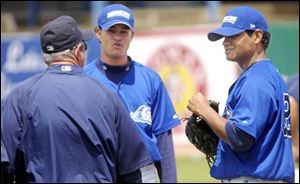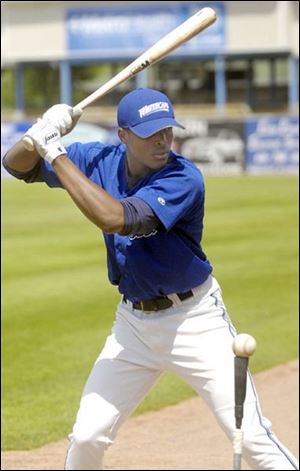
Baseball teams work hard to knock down language barrier
7/6/2008

The corner television inside the Mud Hens clubhouse is usually - but not always - set to Telemundo, a popular Spanish-language network.
But on a rainy night in April, Erick Almonte sauntered over to the television and changed the channel to CNN.
"This is how you learn," said Almonte, a Hens infielder from the Dominican Republic, to a handful of Latin teammates who objected to Almonte's channel changing.
Almonte, 30, said he spoke very little English when he first arrived in Tampa in 1997 as a rookie in the Yankees' organization. He said he taught himself the language by reading American newspapers and turning the subtitles to English for the TV shows and movies he watched.

West Michigan Whitecaps players Wilton Garcia, center, and Mauricio Robles, right, talk with a roving hitting coach before a recent game. Garcia and Robles participate in the Tigers off-the-fi eld language assimiliation program.
"It's very important to learn English, learn what's going on in this country," Almonte said.
Players in the majors or in Triple-A, like Almonte, still have to practice their English skills on their own. But their clubs are stepping in to help, far more than when Almonte broke into baseball.
About 30 percent of all major leaguers are Latin-born, according to the Institute for Diversity and Ethics in Sport. That's almost one-third of a workforce making a minimum of $390,000 a year who speaks a different language than most of the coaches they play for and the fans who idolize them.
Not only must these players hit 95 mph fastballs, they need to learn to live away from the ballpark - whether ordering a meal or opening a bank account - tasks made more difficult without the ability to speak English.
Major League Baseball has responded. Since 2001, the league mandates that each ofits 30 clubs provide English education at teams' Latin American headquarters, in either the Dominican Republic or Venezuela.
But some clubs, including the Detroit Tigers and Cleveland Indians, go far beyond that mandate and have established cultural assimilation programs either in Latin America or here in the States.
"We would be derelict in our duty if we allowed this transition to take place on its own," said Dan Lunetta, the Tigers' director of minor league operations. "We have to do everything we can to help these kids adjust to life in the U.S."
The Indians have a contract with a school in the Dominican Republic that offer players courses in English, math, science, and American culture. The New York Mets, Boston Red Sox, Seattle Mariners, and Kansas City Royals do the same, but with a different a school.

Practice isn t limited to onfi eld activities for Latin players such as Audy Ciriaco of the West Michigan Whitecaps, the Tigers Single-A affiliate.
Players can obtain high school diplomas, and what they learn is reinforced through classes once they reach the United States.
"It's a way to provide more normalcy, more structure for them when they get to the United States," said Ross Atkins, Cleveland's director of player development. "It offers them a chance to grow as humans."
The groundwork for the Tigers' program is laid through the mandatory English classes in Latin America, but their full-blown cultural assimilation courses are offered stateside.
The contrast between the Indians' and Tigers' programs is an example of using different methods to reach the same goal. It's seen throughout baseball, as some clubs go the extra mile with their Latin players and others stick to in-house English classes.
Lou Melindez, vice president of international operations for Major League Baseball, said the league hopes to decide by September whether to build its own school in the Dominican Republic or subsidize the clubs that contract for their Latin players to attend school.
The going rate is from $1,000 to $2,000 per player to send them to
CENAPEC, a nonprofit school established in 1972 in the Dominican
Republic to provide low-cost education to adults. The Indians will send 30 to 50 players, between the ages of 16 and 20, there this year.
Whether in the Dominican Republic or in Lakeland, Fla., in simple English classes or in elaborate assimilation programs, Latin players are taught how to order food in restaurants as well as how to set up and use e-mail, tasks that Americans take for granted.
"If you're from the Dominican Republic and you come to the U.S. or vice versa, it's culture shock," said Rene Francisco, special assistant to Royals general manager Dayton Moore.
Sal Artiaga, the Philadelphia Phillies' director of Latin American operations who has been teaching Latin players English since 1993 when he was with the Chicago White Sox, has written three workbooks used throughout baseball to help with the assimilation process.
Artiaga said speaking English is part of being a pro baseball player.
"Just like they go through the gamut of lifting weights or doing drills, Latin players must work on their language and life skills," Artiaga said. "It's imperative."
On any given night, Tigers manager Jim Leyland's lineup card might include a Renteria, a Polanco, a Guillen, an Ordonez, a Cabrera, and a Rodriguez. All of them speak the language well, save for Cabrera.
"If they can get a hit, I don't care if they speak Spanish, Portuguese or Chinese," Leyland said.
But most players care.
Magglio Ordonez, the Tigers' right fielder and reigning American League batting champion, was in Artiaga's English class over a decade ago when he was with the White Sox.
"I'm still learning," said Ordonez, a Venezuelan. "You try to learn one word a day and keep getting better."
Ordonez laughed at the memory of those English classes and said: "People used to joke that I don't speak English. My bat speaks English."
Lunetta, who oversees the Tigers' minor league operations, said even though a player's success depends on how well he can hit or pitch, "we don't ever want to be in a position where a player has been in this country for six years and says the organization never really helped me understand English or understand life in the U.S."
And there are distinct advantages being able to speak English on the baseball field.
Fred Benavides, minor league field coordinator for the Cincinnati Reds, said the Latin players who learn English, or those who at least put for the effort, are generally more aggressive on the field.
"A guy who is not embarrassed or afraid to mess up when he's learning English makes for a more aggressive player," Benavides said. "The guys who don't learn or don't want to learn, they're generally more reserved. Either way, it translates into how they play."
Melindez, a major league executive, said Latin players with extensive training in English are often times better equipped to play professionally here.
"They can analyze issues, think critically. The feedback I've gotten from one of these schools tell them the players are better critical thinkers and more prepared to play the way they want them to play."
Wilton Garcia, Audy Ciriaco, Alfredo Figaro, and Mauricio Robles file into a cramped conference room at Fifth Third Ballpark in Comstock Park, Mich., home of the West Michigan Whitecaps, a Tigers Single-A affiliate.
They're greeted by Betty Duncan, a middle-aged teacher in the local school system.
On the dry erase board is the phrase "useful expressions," and in front of the four Latino ballplayers are Artiaga's workbooks.
It's the start of another cultural assimilation class, the kind Latinos with the Tigers' lower minor league affiliates have been attending since 2005.
Lunetta said Detroit's program, like many others throughout baseball, is primarily designed to work with players at the Single-A level and below. It begins at the start of minor league spring training and involves three classes per week through the month of March.
After the regular season starts, the program continues in Lakeland for all of the Tigers' remaining minor leaguers there (Single-A and rookie ball teams play in Lakeland) and at West Michigan.
"By the time the players get to Double-A, they're typically prepared to manage on their own," Lunetta said. "If not, we do whatever we can to help them."
On this day in Comstock Park, Duncan is working with Garcia, Ciriaco, Figaro, and Robles on introducing themselves.
"My name is Wilton Garcia, and I am a pitcher," Garcia says during a drill with Duncan.
The teacher also explains the nuances of shopping at gas stations, being interviewed by reporters, and the educational value of reading American newspapers and magazines.
Figaro, a 23-year-old pitcher from the Dominican Republic, said he's learning more in these classes with Duncan than he did in Lakeland, largely because there are fewer Latin players around him.
According to Lunetta, when the season started the Tigers had 145 minor leaguers, and 47 of them were Latinos. Many of them are concentrated in Lakeland, where Detroit's assimilation program is largely based.
"In Lakeland there are so many Latin players, when you back to the hotel you speak Spanish. At the field, you speak Spanish," Figaro said. "Here, most of our teammates speak English. My host family speaks English. We're speaking English on the field and at home, and in here [at class]."
While this program is only in its fourth year with the Tigers, it's nothing new for Lunetta and other Detroit executives.
When Lunetta, current Tigers general manager Dave Dombrowski, and assistant GM Al Avila all held front office roles with the Florida Marlins in the early 1990s, they introduced a program that consisted of more than just simple English classes.
Lunetta, then the Marlins' director of minor league administration, had many discussions with Dombrowski, Florida's GM at the time, and Avila, the Marlins' assistant director of Latin American operations, about how to better help foreign players adapt to playing away from their home countries.
"At the time we were introducing this program, I believe we were on the cutting edge of implementing culturization programs," Lunetta said.
The Marlins had their program up and running in 1993, and one of its first participants was current Tigers shortstop Edgar Renteria, a Columbian who first joined Florida's farm system in 1992.
"I remember that it helped to be in that class," Renteria said. "For a Latin guy who didn't know how to speak any English, I was learning something every day."
Lunetta said the program has evolved since its early Marlins days, with more time now being spent with the players. But he said there is a specific reason why outside instructors have always been relied on to teach these classes instead of Latin-born coaches who can speak Spanish and English.
"That relationship doesn't develop with managers, coaches, and [baseball] instructors," Lunetta said. "The players put so much pressure on themselves to succeed baseball-wise that they don't want to present themselves as being vulnerable to those responsible for their baseball development."
No matter who the teachers are, Atkins, the Indians director of player development who used to run their Latin American operations, said the money spent on these programs is well worth it.
"It's peanuts compared to what we spend on scouting and developing the players, and it helps them learn the skills they'll need to make adjustments when they're here. Making it to the big leagues is all about being able to adjust.
"It's about human beings and competitive advantages."
Contact Joe Vardon at
jvardon@theblade.com
or 419-410-5055.